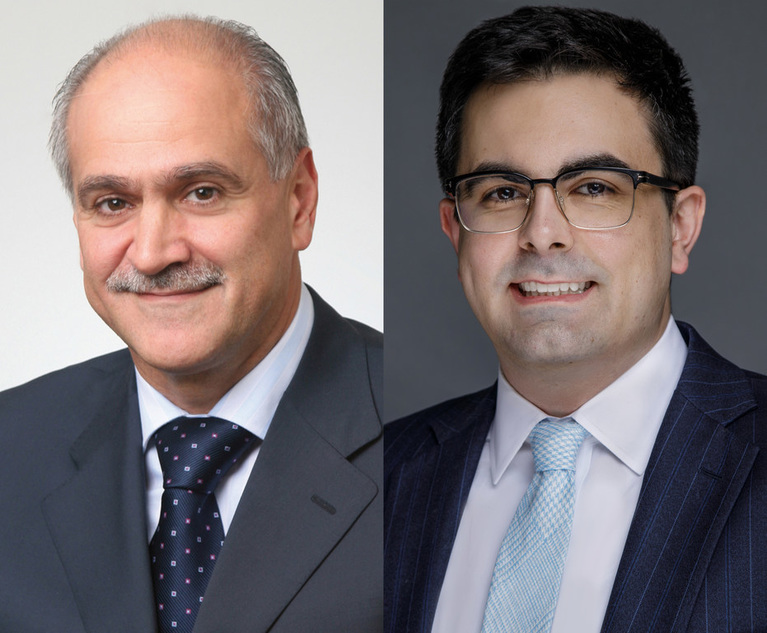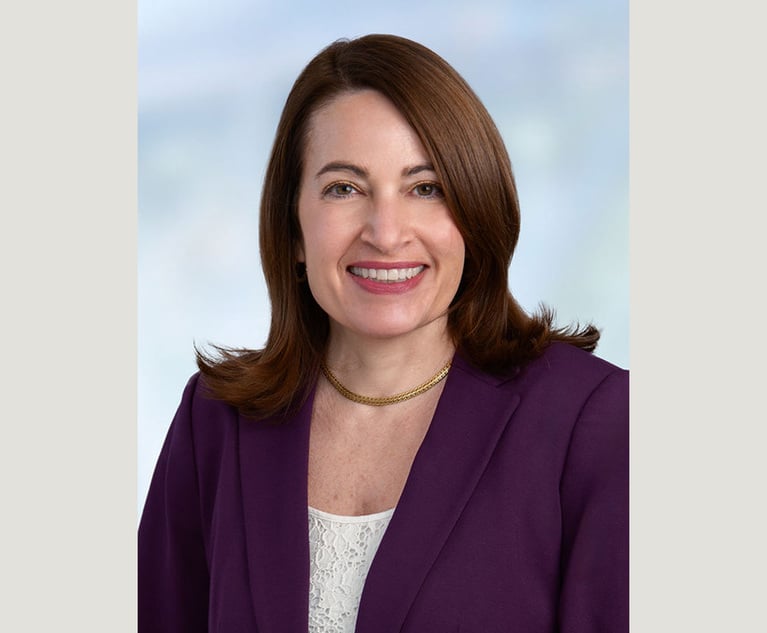Alternative Methods for the Retention of Estate Professionals Are Appropriate in 'Unusual Cases'
Section 327(a) of the Bankruptcy Code allows debtors to employ estate professionals. The section requires these professionals to be "disinterested persons" who "do not hold or represent an interest adverse to the bankruptcy estate."
June 24, 2022 at 12:41 PM
10 minute read
 Rudolph J. DiMassa Jr.,left, and George W. Fitting, right, of Duane Morris. Courtesy photos
Rudolph J. DiMassa Jr.,left, and George W. Fitting, right, of Duane Morris. Courtesy photos
Introduction
Section 327(a) of the Bankruptcy Code allows debtors to employ estate professionals. The section requires these professionals to be "disinterested persons" who "do not hold or represent an interest adverse to the bankruptcy estate." While well-intentioned, Section 327(a) can have an unduly limiting effect on debtors seeking to retain professionals who have performed prepetition services for the debtor and who have gained beneficial institutional knowledge of the debtor's operations. As an example, professionals often provide services to a business that ultimately files for bankruptcy protection. If these prepetition services remain unpaid as of the bankruptcy petition date, the professionals will become creditors of the debtor, and Section 327(a) renders them ineligible to be retained. Additionally, because prepetition directors and officers are excluded from the definition of "disinterested person" as insiders under Section 101(14), a prepetition chief restructuring officer may be unable to continue providing services to the debtor after the petition date.
To facilitate a debtor's post-petition operations, many courts have resorted to Bankruptcy Code Sections 105(a) and 363(b) to approve the employment of professionals who may not otherwise satisfy the restrictive "disinterestedness" requirements of Section 327(a). Section 105(a) bestows upon the court broad equitable powers to "carry out the provisions of" the Bankruptcy Code, while Section 363(b) allows a debtor (after notice and hearing) to "use, sell or lease, other than in the ordinary course of business, property of the estate." While Section 363(b) does not address employment on its face, courts have reasoned that this section affords the debtor significant discretion to use property of the estate (in this case, cash to hire professionals) as long as the debtor uses reasonable business judgment.
In In re Express Grain Terminals, Case No. 21-11832 (Bankr. N.D. Miss. Jan. 31, 2022), the U.S. Bankruptcy Court for the Northern District of Mississippi took things a small step further: in approving the debtor's employment of a turnaround management firm to provide a chief restructuring officer, the court relied on Sections 105(a) and 363(b) rather than on Section 327(a), even though the debtor had employed neither the firm nor its chief restructuring officer before filing for bankruptcy protection. The court determined that it would avoid relying on Section 327(a) because some of the debtor's creditors continued to allege certain improprieties in the turnaround management firm's selection and hiring process, thereby potentially precluding a finding that the firm was "disinterested."
This content has been archived. It is available through our partners, LexisNexis® and Bloomberg Law.
To view this content, please continue to their sites.
Not a Lexis Subscriber?
Subscribe Now
Not a Bloomberg Law Subscriber?
Subscribe Now
NOT FOR REPRINT
© 2025 ALM Global, LLC, All Rights Reserved. Request academic re-use from www.copyright.com. All other uses, submit a request to [email protected]. For more information visit Asset & Logo Licensing.
You Might Like
View All

'In Re King': One Is Definitely the Loneliest Number When Filing an Involuntary Petition
7 minute read
Delaying Rent Payment by Assisted Living and Skilled Nursing Facilities in Chapter 11
7 minute readLaw Firms Mentioned
Trending Stories
- 1US Judge Dismisses Lawsuit Brought Under NYC Gender Violence Law, Ruling Claims Barred Under State Measure
- 24th Circuit Upholds Virginia Law Restricting Online Court Records Access
- 3Lawsuit Against Major Food Brands Could Be Sign of Emerging Litigation Over Processed Foods
- 4Fellows LaBriola LLP is Pleased to Announce that Alisha Goel Has Become Associated with The Firm
- 5Law Firms Turn to 'Golden Handcuffs' to Rein In Partner Movement
Who Got The Work
J. Brugh Lower of Gibbons has entered an appearance for industrial equipment supplier Devco Corporation in a pending trademark infringement lawsuit. The suit, accusing the defendant of selling knock-off Graco products, was filed Dec. 18 in New Jersey District Court by Rivkin Radler on behalf of Graco Inc. and Graco Minnesota. The case, assigned to U.S. District Judge Zahid N. Quraishi, is 3:24-cv-11294, Graco Inc. et al v. Devco Corporation.
Who Got The Work
Rebecca Maller-Stein and Kent A. Yalowitz of Arnold & Porter Kaye Scholer have entered their appearances for Hanaco Venture Capital and its executives, Lior Prosor and David Frankel, in a pending securities lawsuit. The action, filed on Dec. 24 in New York Southern District Court by Zell, Aron & Co. on behalf of Goldeneye Advisors, accuses the defendants of negligently and fraudulently managing the plaintiff's $1 million investment. The case, assigned to U.S. District Judge Vernon S. Broderick, is 1:24-cv-09918, Goldeneye Advisors, LLC v. Hanaco Venture Capital, Ltd. et al.
Who Got The Work
Attorneys from A&O Shearman has stepped in as defense counsel for Toronto-Dominion Bank and other defendants in a pending securities class action. The suit, filed Dec. 11 in New York Southern District Court by Bleichmar Fonti & Auld, accuses the defendants of concealing the bank's 'pervasive' deficiencies in regards to its compliance with the Bank Secrecy Act and the quality of its anti-money laundering controls. The case, assigned to U.S. District Judge Arun Subramanian, is 1:24-cv-09445, Gonzalez v. The Toronto-Dominion Bank et al.
Who Got The Work
Crown Castle International, a Pennsylvania company providing shared communications infrastructure, has turned to Luke D. Wolf of Gordon Rees Scully Mansukhani to fend off a pending breach-of-contract lawsuit. The court action, filed Nov. 25 in Michigan Eastern District Court by Hooper Hathaway PC on behalf of The Town Residences LLC, accuses Crown Castle of failing to transfer approximately $30,000 in utility payments from T-Mobile in breach of a roof-top lease and assignment agreement. The case, assigned to U.S. District Judge Susan K. Declercq, is 2:24-cv-13131, The Town Residences LLC v. T-Mobile US, Inc. et al.
Who Got The Work
Wilfred P. Coronato and Daniel M. Schwartz of McCarter & English have stepped in as defense counsel to Electrolux Home Products Inc. in a pending product liability lawsuit. The court action, filed Nov. 26 in New York Eastern District Court by Poulos Lopiccolo PC and Nagel Rice LLP on behalf of David Stern, alleges that the defendant's refrigerators’ drawers and shelving repeatedly break and fall apart within months after purchase. The case, assigned to U.S. District Judge Joan M. Azrack, is 2:24-cv-08204, Stern v. Electrolux Home Products, Inc.
Featured Firms
Law Offices of Gary Martin Hays & Associates, P.C.
(470) 294-1674
Law Offices of Mark E. Salomone
(857) 444-6468
Smith & Hassler
(713) 739-1250






